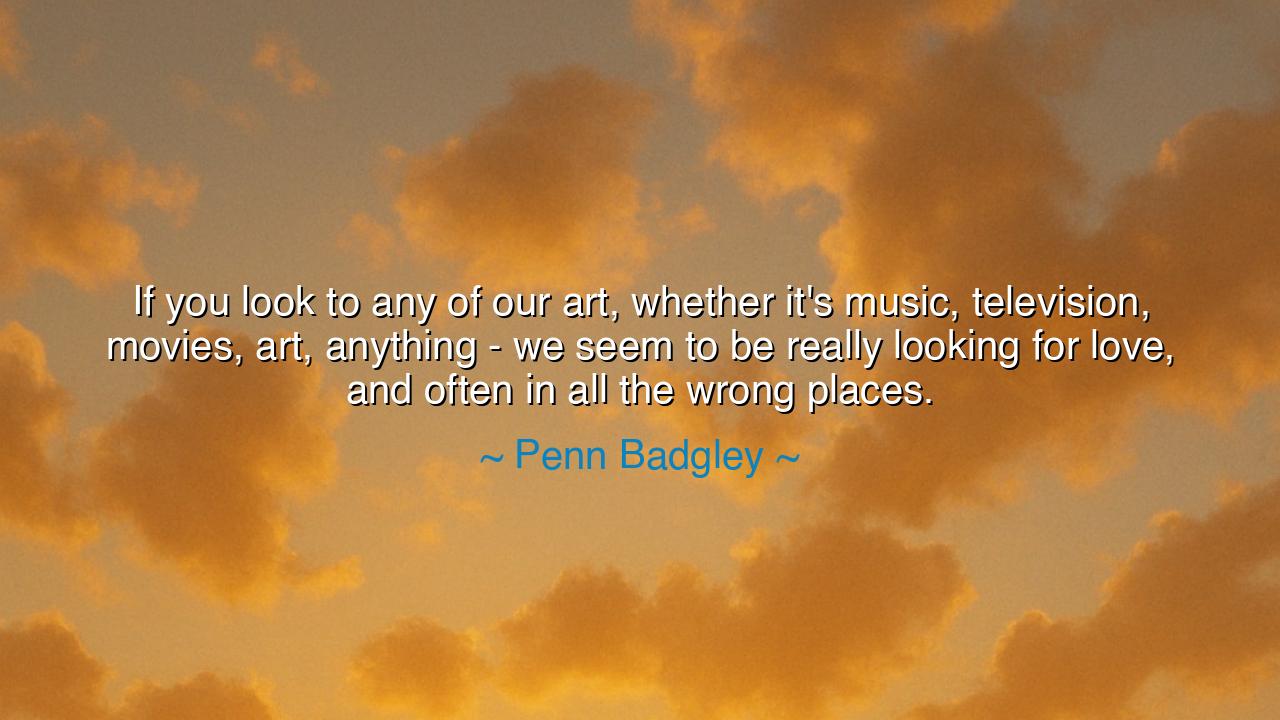
If you look to any of our art, whether it's music, television
If you look to any of our art, whether it's music, television, movies, art, anything - we seem to be really looking for love, and often in all the wrong places.






In the great symphony of human life, there exists a common yearning that transcends time, place, and circumstance—the search for love. Penn Badgley, in his reflection on the nature of human art and experience, speaks to this universal truth when he says, "If you look to any of our art, whether it's music, television, movies, art, anything—we seem to be really looking for love, and often in all the wrong places." This statement reveals the eternal struggle of the human spirit, the search for connection and meaning in a world that often seems to offer only emptiness or fleeting distractions.
Consider the ancient heroes—figures like Achilles and Hector—whose struggles were not only fought on the battlefield but in their hearts. Achilles, for all his strength and valor, sought not only honor but love, even in the harshest moments of his journey. His anger and discontent in the Iliad stemmed from a deep yearning for recognition, affection, and connection. Similarly, Hector fought not only for the future of Troy but for the love of his family and his people. In both cases, their battles were as much about the search for love as they were about war. Yet, in their quests, both Achilles and Hector struggled to find that love in the right places, caught up in pride, revenge, and the wrath of the gods, much like us in the present age.
In the ancient wisdom of Plato, we find the notion that the highest form of love is not the love of the body or material world, but the love of the soul—a deeper, purer love that transcends fleeting desires. In his Symposium, Plato speaks of Eros, the god of love, not as a mere force of physical attraction but as a powerful desire for truth and goodness. In this sense, the ancient philosophers were acutely aware of the dangers of seeking love in the wrong places—the pursuit of shallow relationships, lust, or temporary pleasures would never fulfill the deeper, spiritual longing that resides in every human heart. Badgley’s words echo this ancient teaching, as he points to the search for love in modern art, where the pursuit of true connection is often distorted by the distractions of the world.
The struggle between seeking true love and settling for false representations of it is not new. Take, for example, Romeo and Juliet, whose tragic love story stands as a powerful symbol of youthful passion that, while pure in its intent, is misguided by the forces around them. Their love is true, yet it is clouded by the feuds and misunderstandings of the world they live in, leading them to act in ways that ultimately doom them. Shakespeare’s timeless tale highlights how, even when we find something pure and beautiful, the wrong circumstances and the wrong choices can lead us astray. In the same way, in the art of today, we often find ourselves drawn into stories and experiences that seem to promise love, but are instead riddled with distractions and misunderstandings.
This misguided search for love is deeply woven into the fabric of our modern entertainment, whether through the music we listen to, the movies we watch, or the stories we consume. Badgley’s insight reveals a painful truth: we often seek love in the wrong places, turning to fleeting experiences, empty promises, or shallow connections in the hope of finding something that will make us feel whole. Yet, like the heroes of the ancient world, we must learn to look beyond the distractions and seek the true love that connects us to our deeper selves, to the divine and to each other in a more profound way. The great artists and philosophers of old understood that the journey of seeking love is not a superficial one but a path that requires wisdom, sacrifice, and a willingness to look inward.
The lesson we must take from Badgley’s words and the wisdom of the ancients is this: the search for love must begin within, and only then can we find the authentic connections we seek in the world. To find true love, we must first learn to love ourselves and seek truth rather than fleeting pleasures. The heroes of old did not always find love in the right places, but their journey teaches us that it is not the destinations we choose that matter, but the wisdom we gain through our search. Like Achilles, whose passion led him to great deeds and great pain, we too must choose our path wisely and seek love in a way that leads to growth and fulfillment, not distraction or despair.
As you walk through life, remember that the search for love is a journey—not a destination. Be mindful of the places you turn to in your quest for connection, and do not be swayed by the noise of the world around you. Seek love that is pure, that is based on truth, and that connects you to something greater than yourself. In the end, the truest love comes not from external sources but from the deep, abiding relationship you cultivate with your own heart, your soul, and the world around you. Let this be the legacy of your search—for it is only through the right pursuit that you will find the love that truly fulfills you.






AAdministratorAdministrator
Welcome, honored guests. Please leave a comment, we will respond soon